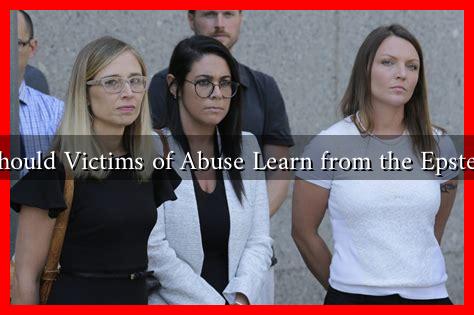-
Table of Contents
What Should Victims of Abuse Learn from the Epstein Case
The case of Jeffrey Epstein, a financier and convicted sex offender, has shocked the world and brought to light the pervasive issues of sexual abuse, exploitation, and the failures of the justice system. For victims of abuse, the Epstein case serves as a complex lesson in resilience, advocacy, and the importance of speaking out. This article explores the key takeaways from the Epstein case that can empower victims and inform their paths to healing and justice.
The Importance of Speaking Out
One of the most significant lessons from the Epstein case is the power of speaking out. Many victims remained silent for years due to fear, shame, or disbelief that they would be taken seriously. However, the eventual testimonies of Epstein’s victims played a crucial role in bringing him to justice.
- Breaking the Silence: Victims should understand that sharing their stories can be a powerful tool for healing and advocacy.
. The courage shown by Epstein’s victims has inspired many others to come forward.
- Support Networks: Establishing a support network of trusted friends, family, or professionals can provide the necessary encouragement to speak out.
- Legal Protections: Many jurisdictions have laws that protect victims from retaliation when they report abuse. Understanding these protections can empower victims to take action.
The Role of Advocacy Groups
The Epstein case highlighted the critical role that advocacy groups play in supporting victims of abuse. Organizations such as the Rape, Abuse & Incest National Network (RAINN) provide resources, counseling, and legal assistance to survivors.
- Access to Resources: Victims should seek out local and national organizations that specialize in supporting abuse survivors. These groups can offer legal advice, therapy, and community support.
- Awareness Campaigns: Advocacy groups often run campaigns to raise awareness about abuse and exploitation, which can help victims feel less isolated and more empowered.
- Legislative Change: Many advocacy organizations work to change laws that protect victims and hold abusers accountable. Victims can get involved in these efforts to help create a safer environment for others.
The Flaws in the Justice System
The Epstein case also exposed significant flaws in the justice system, particularly regarding how sexual abuse cases are handled. Victims should be aware of these issues to better navigate their own experiences with law enforcement and the legal system.
- Victim Blaming: Many victims face skepticism and blame when they come forward. Understanding this reality can help victims prepare for potential challenges in their pursuit of justice.
- Legal Representation: Having a knowledgeable attorney who specializes in abuse cases can make a significant difference in how a case is handled. Victims should seek legal counsel early in the process.
- Public Awareness: The media plays a crucial role in shaping public perception of abuse cases. Victims can leverage media attention to bring their stories to light, but they should also be cautious about how their narratives are portrayed.
Healing and Moving Forward
While the Epstein case is a stark reminder of the prevalence of abuse, it also offers hope for healing and recovery. Victims should focus on their well-being and seek out resources that promote healing.
- Therapeutic Support: Engaging with mental health professionals who specialize in trauma can help victims process their experiences and develop coping strategies.
- Community Engagement: Joining support groups or community organizations can provide a sense of belonging and understanding among those who have faced similar challenges.
- Self-Advocacy: Victims should learn to advocate for their needs, whether in therapy, legal situations, or personal relationships. Empowerment comes from understanding one’s rights and needs.
Conclusion
The Epstein case serves as a powerful reminder of the complexities surrounding abuse and the importance of advocacy, support, and resilience. Victims of abuse can learn valuable lessons from this case, including the necessity of speaking out, the role of advocacy groups, the flaws in the justice system, and the importance of healing. By understanding these elements, victims can empower themselves and others, fostering a community that supports survivors and holds abusers accountable. Ultimately, the journey toward healing and justice is challenging, but it is also a path that can lead to empowerment and change.





